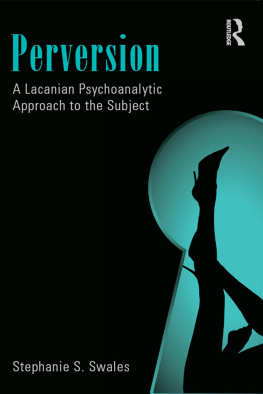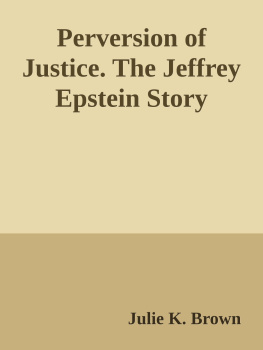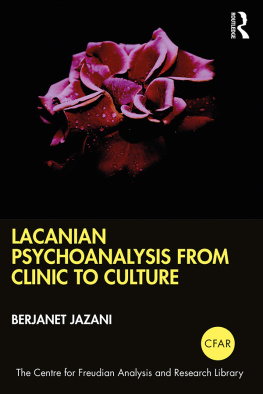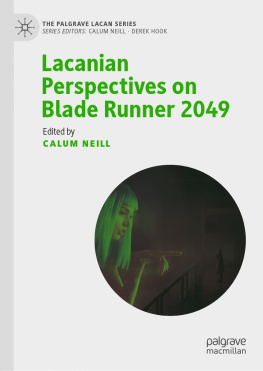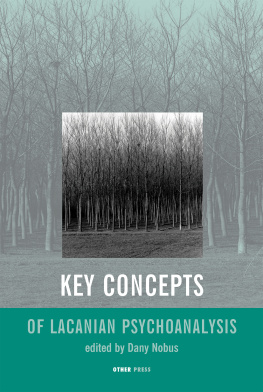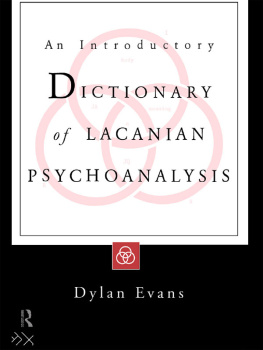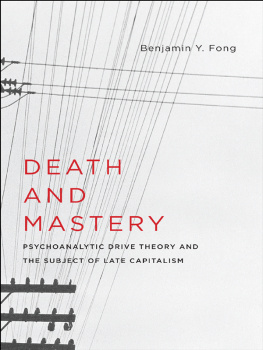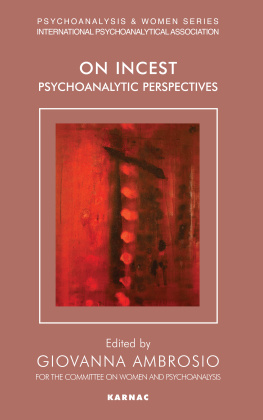Swales - Perversion: a Lacanian psychoanalytic approach to the subject
Here you can read online Swales - Perversion: a Lacanian psychoanalytic approach to the subject full text of the book (entire story) in english for free. Download pdf and epub, get meaning, cover and reviews about this ebook. City: New York;NY, year: 2012, publisher: Taylor & Francis (CAM);Routledge, genre: Romance novel. Description of the work, (preface) as well as reviews are available. Best literature library LitArk.com created for fans of good reading and offers a wide selection of genres:
Romance novel
Science fiction
Adventure
Detective
Science
History
Home and family
Prose
Art
Politics
Computer
Non-fiction
Religion
Business
Children
Humor
Choose a favorite category and find really read worthwhile books. Enjoy immersion in the world of imagination, feel the emotions of the characters or learn something new for yourself, make an fascinating discovery.
- Book:Perversion: a Lacanian psychoanalytic approach to the subject
- Author:
- Publisher:Taylor & Francis (CAM);Routledge
- Genre:
- Year:2012
- City:New York;NY
- Rating:4 / 5
- Favourites:Add to favourites
- Your mark:
- 80
- 1
- 2
- 3
- 4
- 5
Perversion: a Lacanian psychoanalytic approach to the subject: summary, description and annotation
We offer to read an annotation, description, summary or preface (depends on what the author of the book "Perversion: a Lacanian psychoanalytic approach to the subject" wrote himself). If you haven't found the necessary information about the book — write in the comments, we will try to find it.
Swales: author's other books
Who wrote Perversion: a Lacanian psychoanalytic approach to the subject? Find out the surname, the name of the author of the book and a list of all author's works by series.
Perversion: a Lacanian psychoanalytic approach to the subject — read online for free the complete book (whole text) full work
Below is the text of the book, divided by pages. System saving the place of the last page read, allows you to conveniently read the book "Perversion: a Lacanian psychoanalytic approach to the subject" online for free, without having to search again every time where you left off. Put a bookmark, and you can go to the page where you finished reading at any time.
Font size:
Interval:
Bookmark:

PERVERSION
Lacan's psychoanalytic take on what makes a pervert perverse is not the fact of habitually engaging in specific abnormal or transgressive sexual acts, but of occupying a particular structural position in relation to the Other. Perversion is one of Lacan's three main ontological diagnostic structures, structures that indicate fundamentally different ways of solving the problems of alienation, separation from the primary caregiver, and castration, or having limits set by the law on one's jouissance. The perverse subject has undergone alienation but disavowed castration, suffering from excessive jouissance and a core belief that the law and social norms are fraudulent at worst and weak at best.
In Perversion, Stephanie Swales provides a close reading (a qualitative hermeneutic reading) of what Lacan said about perversion and its substructures (i.e., fetishism, voyeurism, exhibitionism, sadism, and masochism). Lacanian theory is carefully explained in accessible language, and perversion is elucidated in terms of its etiology, characteristics, symptoms, and fundamental fantasy. Referring to sex offenders as a sample, she offers clinicians a guide to making differential diagnoses between psychotic, neurotic, and perverse patients, and provides a treatment model for working with perversion versus neurosis. Two detailed qualitative clinical case studies are presentedone of a neurotic sex offender and the other of a perverse sex offenderhighlighting crucial differences in the transference relation and subsequent treatment recommendations for both forensic and private practice contexts.
Perversion offers a fresh psychoanalytic approach to the subject and will be of great interest to scholars and clinicians in the fields of psychoanalysis, psychology, forensic science, cultural studies, and philosophy.
Stephanie S. Swales received her Ph.D. in Clinical Psychology from Duquesne University. Working from a Lacanian orientation, she maintains a private practice conducting work both in-person and by phone.
PERVERSION
A Lacanian Psychoanalytic
Approach to the Subject
Stephanie S. Swales

First published 2012
by Routledge
711 Third Avenue, New York, NY 10017
Simultaneously published in the UK
by Routledge
27 Church Road, Hove, East Sussex BN3 2FA
Routledge is an imprint of the Taylor & Francis Group, an informa business
2012 Taylor & Francis
The right of Stephanie Swales to be identified as author of this work has been asserted by her in accordance with sections 77 and 78 of the Copyright, Designs and Patents Act 1988.
All rights reserved. No part of this book may be reprinted or reproduced or utilized in any form or by any electronic, mechanical, or other means, now known or hereafter invented, including photocopying and recording, or in any information storage or retrieval system, without permission in writing from the publishers.
Trademark notice: Product or corporate names may be trademarks or registered trademarks, and are used only for identification and explanation without intent to infringe.
Library of Congress Cataloging in Publication Data
Swales, Stephanie S.
Perversion : a Lacanian psychoanalytic approach to the subject / Stephanie S. Swales. p. cm.
Includes bibliographical references and index.
1. Psychosexual disorders. 2. Sexual desire disorders. I. Title.
RC556.S88 2012
616.8583dc23
2012000034
ISBN: 978-0-415-50128-6 (hbk)
ISBN: 978-0-415-50129-3 (pbk)
ISBN: 978-0-203-12186-3 (ebk)
Typeset in Garamond
by EvS Communication Networx, Inc.
DEDICATED TO MY PARENTS,
WITH GRATITUDE FOR THEIR LOVE
WHICH BROUGHT ME HERE.
CONTENTS
ACKNOWLEDGMENTS
I give my thanks to the great many people who, through their teaching, mentorship, support, and encouragement, helped me complete this book. First of all, I would like to thank my editor, Kristopher Spring, and Routledge for publishing this book.
I owe my profound thanks to the patients about whom I wrote in this book. They trusted me to assist them in their brave explorations of their psyches, and I hope that they found their participation in the psychotherapeutic process made a lasting positive impact on their lives. I hope that they have continued the sometimes difficult but ultimately immeasurably rewarding process of psychotherapy.
Dr. Bruce Fink directed my doctoral dissertation upon which this book is based. He did so with enthusiasm, careful attention to detail, and his vast knowledge of Lacanian theory and its clinical applications. In his various roles as my dissertation director, clinical supervisor, professor, mentor, and author of numerous excellent books, Dr. Fink has profoundly influenced my understanding of Lacan's oeuvre, my clinical work, and my ways of thinking about human life and psychopathology. What is more, Dr. Fink encouraged my own style of thinking, writing, and working with patients. I also thank Dr. Fink for having translated into English the excerpts from Lacan's work quoted in this book.
Dr. Robert Coufal, who served as a committee member for my dissertation, has also had a significant impact on my clinical work and interests. With his tireless commitment to individualized clinical care, he showed me that forensic clinicians can make an impact both on the lives of forensic patients and on the forensic system as a whole. Dr. Coufal's humanistic, existential-phenomenological, and psychodynamic perspectives on forensic psychotherapeutic work impressed and inspired me. I am lucky to have had such a kind, supportive, thought-provoking, and ethically sensitive clinical supervisor and dissertation reader.
Dr. Jessie Goicoechea not only contributed to this book as a committee member for my dissertation, but also as a professor and clinical supervisor responsible for orienting my introduction to clinical work. Through her teaching, Dr. Goicoechea passed on her compassion and respect for those who undergo psychotherapy. I am grateful to Dr. Goicoechea for having supported my growth as a clinician and having taught me her nuanced understandings of using reflexivity as a clinical tool.
Dr. Frank Scalambrino, my fianc, has contributed much to this book and to my growth as a clinician and thinker through his support, encouragement, love, inspiring conversations, and research assistance.
I am thankful to Duquesne's McAnulty College and Graduate School of Liberal Arts for having provided partial funding for this project in the form of their 20092010 Dissertation Fellowship Award.
Dr. Constance Fischer has been, from the beginning of my graduate studies, a major influence on my growth as a person and as a provider of psychotherapy and collaborative assessments. Dr. Fischer touched me with her kindness, moral courage, unflagging encouragement, and wisdom. That which Dr. Fischer brings to humanistic and existential-phenomenological approaches to clinical work makes her one of the great psychologists of our day. I am thankful for her mentorship and for her useful comments on an early version of my book.
I owe my gratitude to the members of Affiliated Psychoanalytic Workgroups who provided helpful comments on an early version of of my book. In particular, I would like to thank Dr. Michael J. Miller, Dr. Dany Nobus, Dr. Rolf Flor, Dr. Barry O'Donnell, Dr. Lynn Harper, Dr. Katerina Daniel, and Dr. Lawrence Wetzler.
INTRODUCTION
That is the paradox of the perverse analysand: He is someone who has a sure answer but is nevertheless perplexed.
Font size:
Interval:
Bookmark:
Similar books «Perversion: a Lacanian psychoanalytic approach to the subject»
Look at similar books to Perversion: a Lacanian psychoanalytic approach to the subject. We have selected literature similar in name and meaning in the hope of providing readers with more options to find new, interesting, not yet read works.
Discussion, reviews of the book Perversion: a Lacanian psychoanalytic approach to the subject and just readers' own opinions. Leave your comments, write what you think about the work, its meaning or the main characters. Specify what exactly you liked and what you didn't like, and why you think so.

